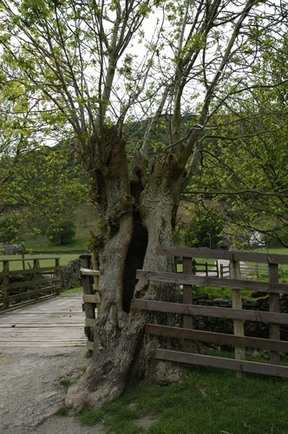Trees
Trees are truly a biological wonder. They are the largest known organisms on earth. The Giant Sequoia known as General Sherman in California has a trunk volume of 1486 m2. That is almost 4 Olympic sized swimming pools
They are also the tallest organisms on earth. A Coast Redwood named Hyperion, again from California was 115.5 metres high when last measured.
The Bristlecone Pine named Methuselah, yet again from California is wildly held to be the oldest tree(and possibly organism) in the world and is aged approx. 4700 years. However this tree has been made to look like a teenager compared to a humble Spruce tree in Sweden that has been aged at 9550 years old. That's one record wrestled out of the hands of California.
Trees are very important to the planet. We always have been, and always will be totally reliant upon them. We all know that we get most of our oxygen from trees and that trees help to remove some of the carbon dioxide we spew out at every turn we make. Even in this age of man-made materials, we find that most of them are made from oil, and oil is made, in the main, from very, very old trees. In the future will have to depend more upon trees and wood if mankind is to have a future at all.
Trees provide huge resources for both mankind and nature. We see the concrete carbuncles of the 1960s swept away these days as an embarrassment to human endeavour, yet the oak roof beams of Norman churches still stand almost 1000 years after they where first erected. The products of trees are often superior to man-made efforts. It takes 12 times more energy to produce a steel beam that will provide the same load bearing capacity of one of wood.
The native oaks of Britain provide home and food for 286 different species of invertebrate. Add to this the birds, mammals, plants, mosses, liverworts, bacteria and viruses that also live in and on the oak and we get a picture of an environment that is fantastically complex. Recent studies have shown that, in the UK, willow species harbour even more invertebrates than the oak.
Some of the relationships between trees and organisms living on or around them are considered harmful to the trees. However, increasingly we see, when studies are made, what was thought of as a pest of the tree can be an ally of the tree. A fungus that eats away the heartwood of a large tree actually helps the tree by reducing the volume of wood that requires feeding, tending and defending. As long as the tree can avoid fungal infection of the new wood it creates, it can continue to grow with increased vigour, unchained from the extra burden of the heartwood that the fungi eats and eventually makes into a nice fertiliser for the tree.
There is a great deal more going on inside a tree than anyone can tell. Chemical signals tell the tree which way to grow, how to lay down roots, when to break bud, how to defend itself, how quickly to grow and also to measure its environment with the senses it possesses.
Trees do all this utilising just a tiny array of chemicals. Five hormones, a few pigments and a long list of species dependent secondary metabolites that are used to communicate with each other, those that would attack them and even, with some trees, to call for help to an ally that would eat their attackers.
Homo sapiens are terribly proud of their brains. They aren’t, however, the only way to get things done. If we were to compare the lives of trees and humans to a 10 mile journey, trees would be a little efficient moped. Humans would be a gas guzzling Hummer.
Both trees and humans get the job of living done admirably well, but in very different ways. The human brain guzzles up 30% of all the energy produced by the body. And just think of the trouble having a brain brings. If trees could talk, they would ask why we bothered with such a large, fragile and energy-consuming device. Trees certainly wouldn't live to 9550 years old if they had a brain.
Given the importance of trees to our lives, it is surprising that we know comparatively little about them. Perhaps we have taken trees for granted? If we want to get to the 22nd century, we need to appreciate trees and make use of the great treasures they provide us with.

